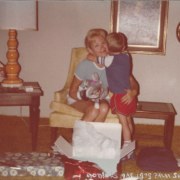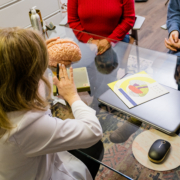Journalist Natalie Morales Uses Platform to Fight Alzheimer’s
Natalie Morales’ mother-in-law, Kay Rhodes, was just 55 when she was diagnosed with early-onset Alzheimer’s disease. For the next 17 years, Kay’s husband, Joe, became her primary caregiver—a role that took a toll on his own physical and mental health. “Her body was still healthy,” Morales said. “It was her brain that was dying. To be diagnosed at 55 and to pass away at 72—that’s 17 years of a huge emotional burden on the people who take on the caregiving.”

As a CBS News correspondent and former co-host of NBC’s Today show, Morales has consistently used her platform to spread awareness about the disease. “I’ve done stories about Kay and what she went through,” she said. “I profiled one woman who volunteered time and helped take care of Kay so my father-in-law could have a day [off]. I’ve done half-marathons to help raise money and awareness. I’m a champion with the Alzheimer’s Association, so whenever they ask me, ‘Is there a way you can help get the word out?’ I try to do that.”
Morales recently spoke with BrainWise about the steps she and her family are taking to decrease their risk of inheriting the disease and her advice to others facing an Alzheimer’s diagnosis. In recognition of Morales’ efforts to advance Alzheimer’s awareness and caregiver support, the National Academy of Neuropsychology (NAN)—which produces BrainWise—will honor Morales with the 2025 Excellence in Advocacy Award at NAN’s annual conference in November.
Top photo: Natalie Morales and her two sons
with her mother-in-law, Kay Rhodes.
Above at right: Natalie Morales.
This Q&A has been edited for length and clarity.
BrainWise: I’d like to start by talking about Kay before her diagnosis. What was she like?
Natalie Morales: Kay was the most wonderful mother. My husband and his sister grew up with great parents who were always there, went to all their games, and helped them with their activities and homework. She was passionate in helping in the community. She was involved in book clubs, had a lot of friends, had a very rich environment around her. She was also involved in stock trading. Actually, she and I shared that interest together. We would share tips with each other. When I first met her, she was addicted to watching her portfolio and figuring out what the next thing was going to be. [She was a] very smart, self-made woman.
Do you remember the first signs that something was wrong?
Yes. It was in the lead-up to [my] wedding planning. We chose to have our wedding in Denver, where they lived, so she was helping me. We sent our wedding bands to Colorado. We know she received them because she signed off on the delivery. And then she hid them. She was concerned about somebody breaking into the house and wanting to steal things. She couldn’t remember what she did with them, so we reported them as lost and ended up having to get replacement bands. After she passed and my father-in-law was cleaning out her things, he found them in the back of her sock drawer hidden along with other things. Food was a big issue. She would hide food around the house. Banana peels were found in linen closets and under cans of food. That was the beginning.
Has your approach to life or your health changed in the years since her diagnosis?
Absolutely. My husband and I take a very active approach to living a healthy lifestyle because we know that’s a big part of the equation. Does it mean it will prevent Alzheimer’s? No. But if there is some genetic link, could it offset progression? There is science that proves [it could]. We get out and do some activity every day, and I encourage my kids to do the same. And that whole thing about rewiring your brain and taking on new challenges, that’s something that’s very important to me. The great thing is, with my job, every day is a new task, a new challenge, a new story that I’m working on, questions I have to ask. Being a journalist, in a way, is the best training to prevent that brain fog because you have to be sharp, you have to be on it, you have to understand what’s going on in the world.
Your father-in-law was Kay’s primary caregiver for many years. What impact did that have on him?
They always say caregivers are the ones who suffer the most. He started having issues with his heart. He had to have a heart valve replacement. And this is a man in his 50s. They had planned for their golden years and had saved money. They were planning to travel and do all these amazing things. In the time that Joe and I were married, I think they took one trip to Europe. After that, [my father-in-law] was like, “I can’t travel with her.” He recognized it was going to be too hard for him, so all those plans went away.
And when you have a person who’s still in their 50s, in the prime of their life, and supposed to be enjoying life, it was [hard]. He took on a lot. We could see his health starting to take a turn. He developed Parkinson’s. He passed away in 2021, during COVID. Depression, loneliness, all those things he suffered with leading up to his death. But he loved her to her dying day. He took wonderful care of her. He did that for 10 years. And finally, in the last five years, they put her in an Alzheimer’s facility, which was incredible. He would go every day to visit her.
What is one thing you want people to know about this disease?
There’s a lot of research on dementia and Alzheimer’s, but if there’s not a genetic link, there’s still so much that hasn’t been figured out. We need to be aware that it can happen to any one of us. I mean, the numbers are staggering. We are all going to be facing or dealing with this in some way in our lifetime.
Do you have advice for those who have a loved one who has been diagnosed?
Don’t be afraid to get help. Caregiving is such a huge responsibility, and it takes a toll. You can’t do it alone. When something like this happens to a family, you need to come together and decide, how are we going to handle this? Have a plan. What are the financial implications? [For Kay] it was $6,000 a month in a special care facility. Everything is getting more expensive in life, so we need to be prepared and to plan for the things out there that are most scary to us. And this disease is very real to all of us.









